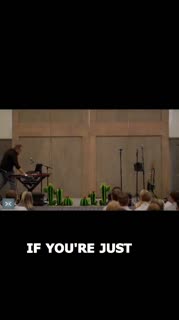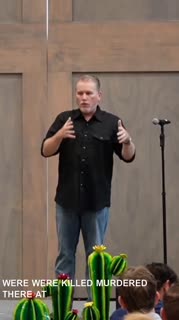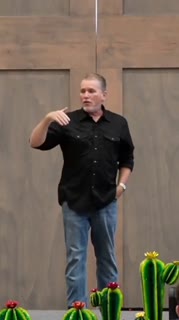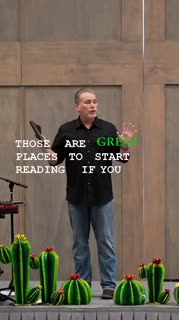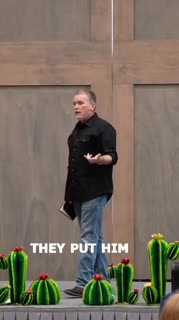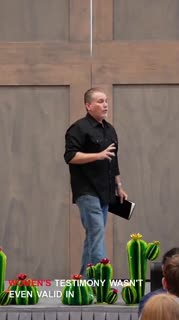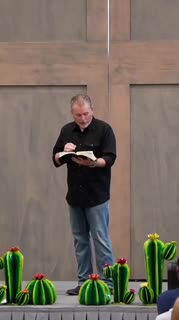Finding True Life Beyond Dead Places
Devotional
Sermon Summary
Bible Study Guide
Sermon Clips
1. "If you're just joining us for the first time last week We started a series called two-step in Because we in Georgetown have the two-step In festival I know we've got people that came In from out of town for Easter What does that mean well two-step in Is a festival about 35,000 People coming in to listen to country music From all different genres and so we decided To start this series called two-step in Where we're giving away some Two-step in festival tickets and all kinds Of other things and as we were making Our plans we started it and we thought Well Easter falls We're gonna do a little bit of a right in the middle of two-step and what do we do do we take a break and do we do we do just easter and then somebody said hey you know all of our sermons for this series are all titled after songs of people who are coming to two-step in and someone said well pat green has three days we're like well there's your easter sermon right there right like that makes sense and so so welcome if you go why do you have cacti and boots on the stage because we're uh getting ready for that coming so i was i think scott might have said earlier one of the values we have at city church one of our values is to be known we want people to have relationships we want people to have groups of people that they they get into the bible together with that they pray together that when the bottom of life falls out and you don't know what to do and it happens at two o'clock in the morning we call them 2 a.m friends that you can pick up a phone and you know people are going to show up because you've got a group of people who know you and are going to walk with you well we try to do that through small groups and this past sunday had a group of young adults meeting and i was helping get their small group launched and kind of the intro question is our first time meeting was they go around the circle tell everybody your name and tell everybody the most interesting place you've been we got about 10 young adults sitting in that small group and out of the 10 two different people's most interesting place was auschwitz in poland the famed concentration camp i thought that's crazy that in a group of eight to ten people two people have been there i just happened to be one of them and that was one of the most interesting places that i've been as well i got to go because of mission trips and taking some teenagers through and walk through auschwitz and i say if you've been realizing most people probably haven't it is a surreal experience you pull up in vehicles full of teenagers and they're laughing talking having a good time and and you get off the vehicles and you walk through the gates and all of a sudden the laughing and the joking and all of the fun kind of disappears like it goes away because you are you're on some hallowed ground is what it feels like if you don't know auschwitz over a million jews during world war ii" [00:01:39] (156 seconds)
2. "were were killed murdered there at auschwitz and so as you walk through the gates and you walk through most of the barracks where people lived have been torn down or they were bombed there's a couple that are still standing and you can walk through those rooms and you can you can literally see and touch and feel the the bunk beds that eight nine people slept on at a time it's crazy you can walk through the gas chambers you can walk through not walk through but walk by the the incinerators where they burned bodies one of those times walking through that place we come through the gas chamber and it's it's it's kind of like ikea you start in and you got to go all the way there's no there's no ways around right you're once you're in you've got to follow the path whereas we're following the path there's about 10 or 12 jewish men and women and they are singing some old jewish songs and they are weeping and sobbing and this is 70 years after the fact and you walk in as american like having seen things this historical thing and here are these people having this moment and it just feels uncomfortable like it's it's hard and you kind of walk through and you go through surreal experience incredible experience powerful experience heavy experience you know one of the things that you don't see at auschwitz though and this is true first service kind of felt guilty about laughing and laughing about this but it's true like you know what you don't see at auschwitz you don't see people having weddings there right there's no one that's like you know hey we need a venue and someone goes well i know a place it's not booked very often uh you can probably get in for cheap you don't do that like it doesn't it doesn't even make sense because you're not putting something that is future focused and joy filled like a wedding in a in a venue or a place that is historical and about death and pain and suffering if you did like if you got invited to that you would have this feeling of dissonance like these things are going to go together you go that that's just weird and i feel it right if football season's around and you've got a group of friends and they're coming around and they're like hey" [00:04:14] (126 seconds)
3. "When everybody come over, eight, nine guys, come over and watch the football game, and you show up with a six-pack of beer to the football game with all your friends, no one thinks different of that, right? That's normal, unless you grew up Baptist, then you've got to look around to see who else is there, right? You don't want to be caught there. But that's just normal, not dissonance there. But if you get invited to a six-year-old's, like, birthday party at the trampoline park, and you come sauntering through the door with your six-pack of beer, like, what's up, everybody? That feels uncomfortable, right? Like, that's really not, like, six-year-old birthday parties and alcohol, they don't really go together, right? You would feel that dissonance. You'd feel those two parties that don't go together kind of clashing. Now, unfortunately, those things, you think about a wedding in Auschwitz, like that, like, we feel it. Because you don't look for life among dead things, right? You don't look for life in dead things. If you go, hey, six-year-old, alcohol, like, yeah, it doesn't go together. You feel that. But for a lot of us, we have that dissonance. We have those two unlikely parties clashing in our lives every day, and we actually feel the dissonance. We just haven't been able to, like, put our finger on what that feeling is. Let me give you just one of about a thousand examples it could be." [00:06:21] (75 seconds)
6. "Those are great places to start reading if you haven't read your Bible. Great places to start. They tell the story of Jesus. And then the last part of the New Testament is letters to churches of how you and I can live out the teachings of Jesus. So when you go to Luke chapter 24, we are in what we call the Gospels, the stories of Jesus. And let me give you the context of what's happened. It's the very end. Jesus has had his ministry, three plus years of walking, teaching, healing people, doing miracles. His disciples follow him, gathering a crowd of people who are interested in seeing more about who he is. Unfortunately, all that interest has drawn ire from the religious leaders. They arrest him. on Thursday night of this week that we celebrate. And on early mornings of Friday morning, he's beaten. He's got a crown of thorns pressed onto his head. He's hit with rods. He's spit upon. He's flogged, a cat of nine tails, whipping across his back 39 times, most likely. He carries a cross, and on Friday morning, he's crucified. You've seen the pictures and paintings and things. A nail, not driven through his hands, but driven through his wrists, driven through his legs, and he's left on the cross, and he dies a death of suffocation. That's how he died on the cross. They take his body off Friday before sunset." [00:09:50] (77 seconds)
7. "They put him inside a borrowed tomb of someone else, a man named, I forgot his name now, put him in a borrowed tomb. Saturday, nobody can do anything because it's the Sabbath, and the Jews can't work on Sabbath. And so Sunday morning, early in the mornings, first they can do something. Some ladies come to the tomb, and here's where we pick up the story. Luke 24, verse 1 through 7. We're just going to read a couple. We're just going to read a couple verses at a time. Verses 1 says this. But very early on Sunday morning, the women went to the tomb, taking the spices they had prepared. They found that the stone had been rolled away from the entrance. We're going to stop there. We're going to keep going. We're going to stop there because this is very significant. It's significant that Luke tells us as he's telling the story about Jesus being resurrected that women are the first people to show up at the scene. It's significant for a couple reasons. One, if you are Luke, and you are telling a story that you believe is the most life-changing story of all times, if you think that this story has the power to change the world and you want everybody to know it and you want everybody to believe it, in first-century Roman life, in first-century Jewish context, you don't have women as the star of the show. I mean, Jesus is the star of the show, obviously, but you don't have them as the first ones there because in their culture, women were considered second-class citizens." [00:11:07] (84 seconds)
8. "Women's testimony wasn't even valid in conversation, course of law, things like that. And so to... When Luke says, hey, there were women that showed up on the scene, what we know is Luke isn't trying to spin a narrative. Luke isn't going, hey, this is really cool. Let me get everybody to know this, and I want it to be powerful. He's just simply giving the facts. He's just telling us what happened, that women were the first one to show up on the scene. Here's why else it's significant. Because we see throughout Scripture the way that God works. At his birth, the people that heard first were the shepherds who had no social clout. They weren't people of importance. And then at the resurrection, women who, again, were considered second classes are the first people that the message is given to. Because God, through the beginning of time, loves people. He sees people who other people don't see, and he meets them there. You'll hear people say, they'll talk about the Bible as like, oh, the Bible is this anti-women book. And I tell you, if you start reading the New Testament, you understand the culture and the context of what's happening. The New Testament is anything but above. A book or a collection of stories that holds women down. They actually lift women up. Because Jesus loved men and women equally. And I love this part of the story. That we see women who didn't have a voice are the first person to give a voice about the resurrected Jesus. Verse 3 says, So they went, but they didn't find the body of the Lord Jesus." [00:12:38] (91 seconds)
9. "As they stood their puzzle, two men suddenly appeared to them, clothed in dazzling robes. The women were terrified and bowed with their faces to the ground. So I want you to just kind of put yourself in their shoes for a second. Because we know the story. We know how the story ends. We know in a few seconds, the tomb's empty, Jesus is alive, this isn't your first Easter. If it is, I'm sorry I just spoiled it for you. But I'm just assuming most of us have the spoiler alert already, right? So we knew that. But when they come, they don't know that. They come with the terror of Friday right behind them, the crucifixion, and seeing their Lord, seeing the great teacher, seeing the one who they thought was going to be a political king that would change their life, crucified. And Saturday they sat in silence because they couldn't do anything. They just sat there and let the depression sink in. Let the fear of what comes next sink in. And on Sunday morning they get up and as they are headed to the tomb, even though we're going to find out in a second Jesus told them he would be resurrected, they're coming with burial tools. They're coming to embalm the body. They're coming expecting that the story has ended. The chapter's closed. We thought this was it. We put all of our hopes in Jesus. We put all of our hopes in this. And we thought that this was going to be the game changer for everything. But we watched him die and we watched him buried. And we've just been waiting to kind of close the door. So they walk in. These ladies come with a sense of hopelessness." [00:14:02] (88 seconds)
Ask a question about this sermon
2. "were were killed murdered there at auschwitz and so as you walk through the gates and you walk through most of the barracks where people lived have been torn down or they were bombed there's a couple that are still standing and you can walk through those rooms and you can you can literally see and touch and feel the the bunk beds that eight nine people slept on at a time it's crazy you can walk through the gas chambers you can walk through not walk through but walk by the the incinerators where they burned bodies one of those times walking through that place we come through the gas chamber and it's it's it's kind of like ikea you start in and you got to go all the way there's no there's no ways around right you're once you're in you've got to follow the path whereas we're following the path there's about 10 or 12 jewish men and women and they are singing some old jewish songs and they are weeping and sobbing and this is 70 years after the fact and you walk in as american like having seen things this historical thing and here are these people having this moment and it just feels uncomfortable like it's it's hard and you kind of walk through and you go through surreal experience incredible experience powerful experience heavy experience you know one of the things that you don't see at auschwitz though and this is true first service kind of felt guilty about laughing and laughing about this but it's true like you know what you don't see at auschwitz you don't see people having weddings there right there's no one that's like you know hey we need a venue and someone goes well i know a place it's not booked very often uh you can probably get in for cheap you don't do that like it doesn't it doesn't even make sense because you're not putting something that is future focused and joy filled like a wedding in a in a venue or a place that is historical and about death and pain and suffering if you did like if you got invited to that you would have this feeling of dissonance like these things are going to go together you go that that's just weird and i feel it right if football season's around and you've got a group of friends and they're coming around and they're like hey" [00:04:14] (126 seconds)
3. "When everybody come over, eight, nine guys, come over and watch the football game, and you show up with a six-pack of beer to the football game with all your friends, no one thinks different of that, right? That's normal, unless you grew up Baptist, then you've got to look around to see who else is there, right? You don't want to be caught there. But that's just normal, not dissonance there. But if you get invited to a six-year-old's, like, birthday party at the trampoline park, and you come sauntering through the door with your six-pack of beer, like, what's up, everybody? That feels uncomfortable, right? Like, that's really not, like, six-year-old birthday parties and alcohol, they don't really go together, right? You would feel that dissonance. You'd feel those two parties that don't go together kind of clashing. Now, unfortunately, those things, you think about a wedding in Auschwitz, like that, like, we feel it. Because you don't look for life among dead things, right? You don't look for life in dead things. If you go, hey, six-year-old, alcohol, like, yeah, it doesn't go together. You feel that. But for a lot of us, we have that dissonance. We have those two unlikely parties clashing in our lives every day, and we actually feel the dissonance. We just haven't been able to, like, put our finger on what that feeling is. Let me give you just one of about a thousand examples it could be." [00:06:21] (75 seconds)
6. "Those are great places to start reading if you haven't read your Bible. Great places to start. They tell the story of Jesus. And then the last part of the New Testament is letters to churches of how you and I can live out the teachings of Jesus. So when you go to Luke chapter 24, we are in what we call the Gospels, the stories of Jesus. And let me give you the context of what's happened. It's the very end. Jesus has had his ministry, three plus years of walking, teaching, healing people, doing miracles. His disciples follow him, gathering a crowd of people who are interested in seeing more about who he is. Unfortunately, all that interest has drawn ire from the religious leaders. They arrest him. on Thursday night of this week that we celebrate. And on early mornings of Friday morning, he's beaten. He's got a crown of thorns pressed onto his head. He's hit with rods. He's spit upon. He's flogged, a cat of nine tails, whipping across his back 39 times, most likely. He carries a cross, and on Friday morning, he's crucified. You've seen the pictures and paintings and things. A nail, not driven through his hands, but driven through his wrists, driven through his legs, and he's left on the cross, and he dies a death of suffocation. That's how he died on the cross. They take his body off Friday before sunset." [00:09:50] (77 seconds)
7. "They put him inside a borrowed tomb of someone else, a man named, I forgot his name now, put him in a borrowed tomb. Saturday, nobody can do anything because it's the Sabbath, and the Jews can't work on Sabbath. And so Sunday morning, early in the mornings, first they can do something. Some ladies come to the tomb, and here's where we pick up the story. Luke 24, verse 1 through 7. We're just going to read a couple. We're just going to read a couple verses at a time. Verses 1 says this. But very early on Sunday morning, the women went to the tomb, taking the spices they had prepared. They found that the stone had been rolled away from the entrance. We're going to stop there. We're going to keep going. We're going to stop there because this is very significant. It's significant that Luke tells us as he's telling the story about Jesus being resurrected that women are the first people to show up at the scene. It's significant for a couple reasons. One, if you are Luke, and you are telling a story that you believe is the most life-changing story of all times, if you think that this story has the power to change the world and you want everybody to know it and you want everybody to believe it, in first-century Roman life, in first-century Jewish context, you don't have women as the star of the show. I mean, Jesus is the star of the show, obviously, but you don't have them as the first ones there because in their culture, women were considered second-class citizens." [00:11:07] (84 seconds)
8. "Women's testimony wasn't even valid in conversation, course of law, things like that. And so to... When Luke says, hey, there were women that showed up on the scene, what we know is Luke isn't trying to spin a narrative. Luke isn't going, hey, this is really cool. Let me get everybody to know this, and I want it to be powerful. He's just simply giving the facts. He's just telling us what happened, that women were the first one to show up on the scene. Here's why else it's significant. Because we see throughout Scripture the way that God works. At his birth, the people that heard first were the shepherds who had no social clout. They weren't people of importance. And then at the resurrection, women who, again, were considered second classes are the first people that the message is given to. Because God, through the beginning of time, loves people. He sees people who other people don't see, and he meets them there. You'll hear people say, they'll talk about the Bible as like, oh, the Bible is this anti-women book. And I tell you, if you start reading the New Testament, you understand the culture and the context of what's happening. The New Testament is anything but above. A book or a collection of stories that holds women down. They actually lift women up. Because Jesus loved men and women equally. And I love this part of the story. That we see women who didn't have a voice are the first person to give a voice about the resurrected Jesus. Verse 3 says, So they went, but they didn't find the body of the Lord Jesus." [00:12:38] (91 seconds)
9. "As they stood their puzzle, two men suddenly appeared to them, clothed in dazzling robes. The women were terrified and bowed with their faces to the ground. So I want you to just kind of put yourself in their shoes for a second. Because we know the story. We know how the story ends. We know in a few seconds, the tomb's empty, Jesus is alive, this isn't your first Easter. If it is, I'm sorry I just spoiled it for you. But I'm just assuming most of us have the spoiler alert already, right? So we knew that. But when they come, they don't know that. They come with the terror of Friday right behind them, the crucifixion, and seeing their Lord, seeing the great teacher, seeing the one who they thought was going to be a political king that would change their life, crucified. And Saturday they sat in silence because they couldn't do anything. They just sat there and let the depression sink in. Let the fear of what comes next sink in. And on Sunday morning they get up and as they are headed to the tomb, even though we're going to find out in a second Jesus told them he would be resurrected, they're coming with burial tools. They're coming to embalm the body. They're coming expecting that the story has ended. The chapter's closed. We thought this was it. We put all of our hopes in Jesus. We put all of our hopes in this. And we thought that this was going to be the game changer for everything. But we watched him die and we watched him buried. And we've just been waiting to kind of close the door. So they walk in. These ladies come with a sense of hopelessness." [00:14:02] (88 seconds)
